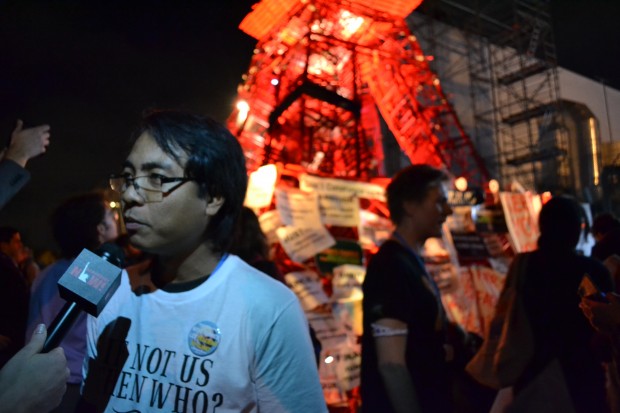
Yeb Saño being interviewed by media in front of the replica of the Eiffel Tower at the 21st Conference of Parties in Paris. Photo by Kristine Angeli Sabillo/INQUIRER.net
PHILIPPINE environmental groups on Tuesday sympathized with President Duterte’s demand for highly industrialized countries to bear the greater responsibility in cutting carbon emissions as part of the global movement to combat climate change.
But Greenpeace Philippines called on the President to reconsider his statement that he would not honor the Paris Agreement, which was signed in December last year by around 200 countries, including the Philippines.
Yeb Saño, executive director of Greenpeace Philippines and former Philippine chief climate negotiator, said he “understands” the President’s position to hold accountable those responsible for the environmental crisis.
Mr. Duterte on Monday said his administration would not honor the Paris Agreement on climate change as this would restrict economic growth and development of the Philippines.
He also blamed developed countries for emissions that had destroyed the Earth’s ozone layer.
Saño said the agreement was based on a voluntary system in which countries set their targets for reducing carbon emission.
He said the agreement had failed the “justice test,” which is based on the principle that “those who should lead in combating climate change are those who are hugely responsible for it.”
But Reuben Andrew Muni, climate and energy campaigner of Greenpeace Philippines, said the President not being a signatory to the agreement could not be used as an excuse not to honor the pact.
“He (Duterte) has a point but it does not mean that we will not do anything because we are on the forefront of climate impact,” he said. The Philippines has committed to reduce carbon emissions by 70 percent by 2030.
But this target is based on the condition that rich industrialized countries will provide financial and technological support to the Philippines, according to Saño.
He said the government should also assess the targets and its socioeconomic impact on various sectors.
Environmental groups called on the Duterte administration to pursue industrialization and economic development without relying on fossil fuels especially coal and instead push for the use of renewable sources of energy.
Kalikasan People’s Network for the Environment said that while it welcomed the President’s “demand for greater responsibility from top polluter countries to cut their carbon emissions, we believe our country’s aspirations for national industrialization can do with the general prescription of the Paris Climate Agreement to reduce our fossil fuel consumption.”
The Institute for Climate and Sustainable Cities said engaging in the UN Framework Convention on Climate Change negotiating process should be continued so that the Philippines could influence the level of ambition, the targets and rules of climate action that would benefit vulnerable countries most.
But Cebu-based environmental lawyer Ben Cabrido said the President’s statement may also be interpreted as “not serious.”
Cabrido was referring to the President’s statement that he was mad at an ambassador who asked him if the Philippines could maintain the level of its carbon footprint.
“He doesn’t want to be bullied around by the developed countries,” Cabrido said.
Mary Ann Lucille Sering, a former vice chair of the Climate Change Commission, said Mr. Duterte’s statement on his refusal to honor the Paris Agreement on climate change could have been a reaction to an improper question from an ambassador.
“In a diplomatic perspective, you don’t ask that question because that’s an imposition on us,”Sering said in a phone interview.
If the Philippines does not ratify the agreement, she said it would not restrict the Philippines’ actions, but the country’s credibility might be affected.
“We might lose out on grants. That is free money. It’s not a loan. It will impact solar investments,” she said.
An environmental group said it was willing to meet and discuss with Mr. Duterte the benefits of reducing the country’s carbon emissions. With a report from Maricar Cinco, Inquirer Southern Luzon